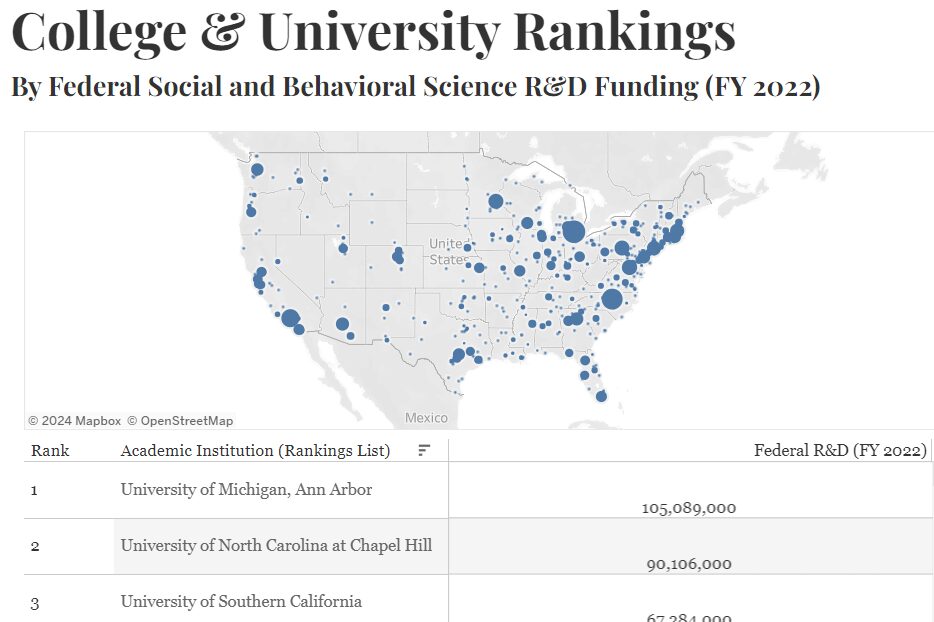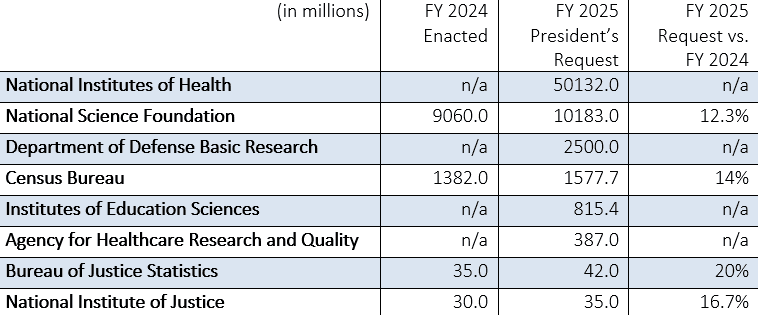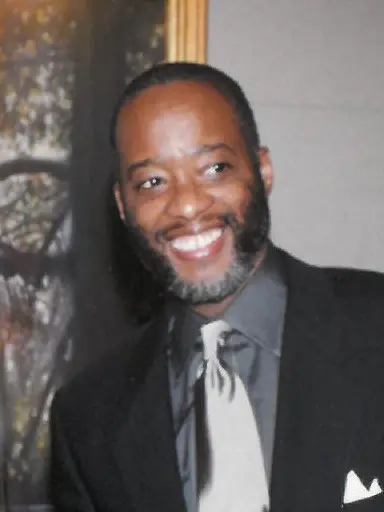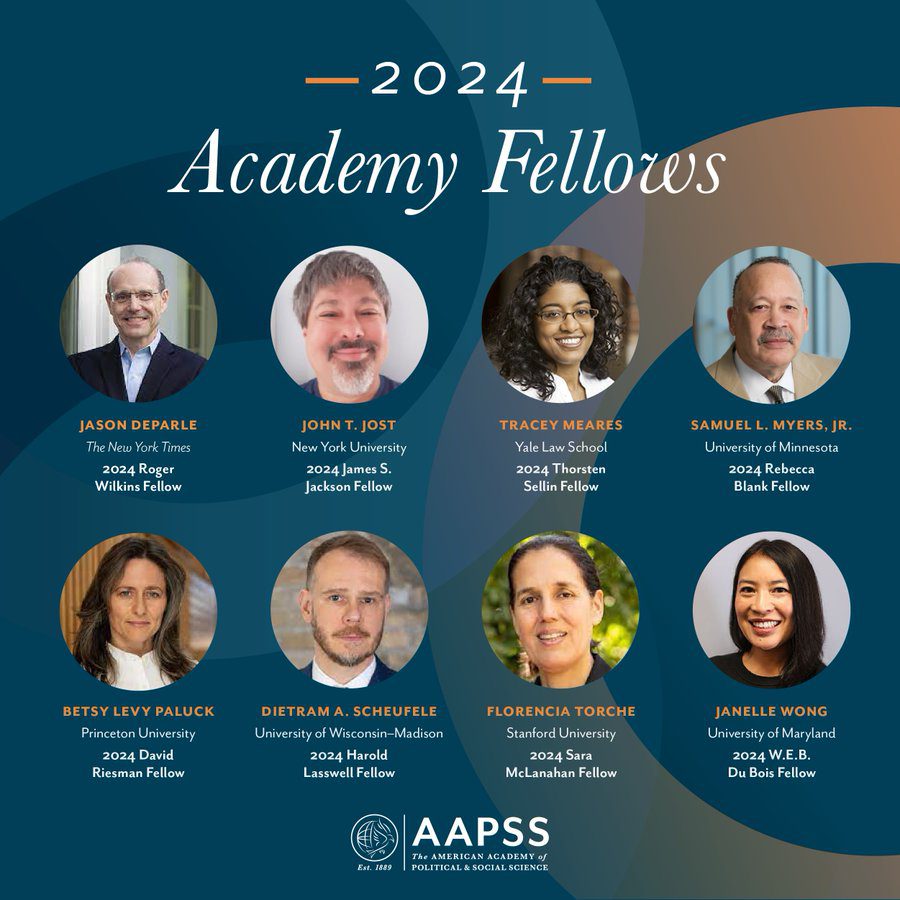Issue 6 (March 19)
Advocacy Day Spotlight: Registration to Close Soon!

Time is running out to register for COSSA’s tenth annual Social Science Advocacy Day. Sign up here before registration closes!
Social Science Advocacy Day will be taking place April 8-9, 2024 in Washington, DC and is open to anyone affiliated with a COSSA member organization or university. Not a member? Learn how here.
If your organization is interested in becoming a sponsor of Social Science Advocacy Day, learn more here.
Visit the COSSA website for the latest information on Social Science Advocacy Day and to view the recording of the recent informational webinar.
COSSA Releases 2024 College & University Rankings for Social & Behavioral Science R&D Funding

On March 13, COSSA released its annual College and University Rankings for Federal Social and Behavioral Science R&D, which highlight the top university recipients of research dollars in the social and behavioral sciences. COSSA’s website also features a rankings dashboard with an interactive map of recipients of social and behavioral science R&D funding so you can see how your university stacks up among U.S. institutions. More edits will come to the dashboard over the coming weeks, so be sure to check back for new features.
Based on federally collected data, the COSSA rankings use an inclusive selection of fields representing the breadth of the social and behavioral sciences to calculate the total federal R&D funding received by universities in the social and behavioral sciences. The 2024 rankings reflect spending from fiscal year 2022, the most current available data. More information on how we produce our rankings is available on our website.
TOP 10 RECIPIENTS OF FEDERAL SOCIAL SCIENCE R&D (2024):
- University of Michigan, Ann Arbor (MI) – $105,089,000 (#1 in 2023)
- University of North Carolina at Chapel Hill (NC) – $90,106,000 (#2 in 2023)
- University of Southern California (CA) – $67,284,000 (#3 in 2023)
- University of Maryland (MD) – $48,084,000 (#4 in 2023)
- University of Minnesota, Twin Cities (MN) – $46,646,000 (#5 in 2023)
- Pennsylvania State University, University Park and Hershey Medical Center (PA) – $46,413,000 (#6 in 2023)
- Harvard University (MA) – $40,928,000 (#7 in 2023)
- Arizona State University (AZ) – $35,874,000 (#8 in 2023)
- University of Georgia (GA) – $35,857,000 (#16 in 2023)
- New York University (NY) – $35,457,000 (#12 in 2023)
Congress Works to Finalize FY 2024 Budget, Looking Forward to FY 2025
The first six of the twelve annual appropriations bills for fiscal year (FY) 2024 were passed by Congress and signed into law by President Biden last week. As previously reported, this included funding for the National Science Foundation, Census Bureau, National Institute of Justice, Bureau of Justice Statistics, and other federal agencies and departments. The bills resulted in funding cuts across all agencies, including the National Science Foundation which received an 8.2 percent cut from FY 2023. COSSA’s in-depth analysis for these bills can be found here.

The remaining six bills have a deadline of Friday, March 22, leaving only a few days for Congress to finalize the FY 2024 process or risk a government shutdown. These bills include funding for the National Institutes of Health, Department of Education, Department of Labor, and other agencies and departments. Should Congress pass its bills by the deadline, it will conclude the protracted FY 2024 appropriations process, nearly six months into the fiscal year that began on October 1, 2023. Like the first six bills, we expect the second package to also include budget cuts for the FY 2024. Watch for COSSA’s final reporting on the FY 2024 appropriations bills.
The Biden Administration’s budget request for FY 2025, the fiscal year that will begin this fall, was recently released. The budget identifies several cross-government priorities for the President, including lowering prices and improving access of healthcare; lowering childcare, housing, and education costs; investing in workers, specifically targeting STEM professionals, and creating jobs; promoting climate change solutions; ending gender-based violence; and more. COSSA will release an in-depth analysis on key agencies of importance to the social and behavioral science community. See below for a preview of the Administration’s budget request:

As always, when considering an Administration’s budget proposal, it is important to remember that it remains a largely symbolic policy document that outlines the Administration’s priorities for the year ahead. While it is possible that some of the President’s requests will be enacted, Congress has the final say over the appropriation of funds. The House and Senate Appropriations Committees will soon set their own spending parameters for each of the 12 annual appropriations bills, which may or may not be able to accommodate all the President’s prioritized investments. Congress will also begin to hold hearings with the individual agencies to discuss their budget requests.
Stay tuned to COSSA’s reporting to get all the details about FY 2024 and FY 2025 science funding.
The State of U.S. Science and Engineering 2024 Released
The National Science Board recently released their The State of U.S. Science and Engineering 2024. The Science and Engineering Indicators report summarizes the status of the science and engineering enterprise within the United States, examining the country’s overall position in the global landscape. This is sourced from nine thematic reports, organized into three main sections—talent, discovery, and translation. These three components collectively support U.S. global competitiveness in science, technology, and innovation (STI), in that science, technology, engineering, and mathematics (STEM) talent contributes to scientific discovery, which in turn is translated to society and the economy through innovation.
The report sheds light on the integral role of STEM talent as a driving force for scientific discovery, which is crucial for innovation that benefits society and the economy. However, the findings also point to areas of concern that demand attention. One notable finding is the decline in mathematics performance among elementary and secondary students following the COVID-19 pandemic. The average mathematics scores for fourth and eighth graders have plummeted, reaching levels not seen in two decades. This downturn poses significant implications for the future STEM talent pool and raises questions about the long-term effects of the pandemic on educational outcomes.
Additionally, it underscores the importance of a robust educational foundation in mathematics and science for maintaining the nation’s innovative edge. The decline in student performance is a sober reminder of the vulnerabilities in the educational system and the need for strategic interventions to support and revitalize STEM education across the country.
The Science and Engineering Indicators report provides insights into the current status and potential future of the U.S. science and engineering sectors. In efforts to ensure that the United States continues to nurture its talent, foster discovery, and translate scientific and engineering advancements into societal and economic benefits.
New Executive Order Targets Protection of Americans’ Data from Foreign Threats
On February 28, the White House issued an Executive Order (EO) titled “Preventing Access to Americans’ Bulk Sensitive Personal Data and United States Government-Related Data by Countries of Concern.” This EO seeks to safeguard the privacy of American citizens and the integrity of government data against foreign exploitation.
Under this guidance, the Attorney General is mandated to formulate regulations that will restrict transactions involving sensitive American data and government-related information, particularly when transactions involve foreign countries or nationals identified as posing security threats. This regulatory framework is aimed at curbing the potential for adversaries to exploit personal and governmental data for nefarious purposes.
In an effort to ensure a well-rounded approach to this critical issue, the National Security Division has announced an Advance Notice of Proposed Rulemaking (ANPRM). This announcement is a call to the public for comments on various aspects of implementing the Executive Order.
Stakeholders, ranging from private citizens to corporations, are encouraged to contribute their perspectives and insights on how best to protect sensitive personal and government data from foreign threats.
Interested parties are invited to submit their comments by April 19, 2024. Submissions can be made through the Federal eRulemaking Portal here.
COSSA Remembers Dr. Norman B. Anderson

COSSA mourns the passing of Norman B. Anderson, PhD, who died unexpectedly on March 1. Dr. Anderson, a clinical psychologist renowned for his research on racial, ethnic, and socioeconomic health disparities, has left an indelible mark on the social and behavioral science community through this leadership, scholarship, and wisdom.
Among his many leadership posts, Dr. Anderson served as the inaugural Director of the National Institutes of Health (NIH) Office of Behavioral and Social Sciences Research (OBSSR) from 1995 to 2000. In this role, he championed the inclusion and integration of the social and behavioral sciences across the NIH, laying the groundwork for many of the programs and initiatives existing today. Dr. Anderson also served as the first African American and second longest CEO of the American Psychological Association, a COSSA founding member. His leadership across the science advocacy community is deeply missed.
A remembrance from his home institution, Florida State University, is available here.
Image: Norman Anderson at the 2000 COSSA Annual Meeting
AEA to Host Summer Evaluation Institute

The American Evaluation Association (AEA) has opened registration for the Summer Evaluation Institute which will take place June 26-28 at the Washington Hilton in Washington, DC. The Summer Evaluation Institute offers development workshops for all experience levels of evaluators as well as applied researchers, grantmakers, foundation program officers, nonprofit administrators, and social science students.
More information about the event can be found here. Any questions can be directed to education@eval.org.
AEA is a COSSA member organization. All COSSA members can receive a 10% discount on general registration costs with the code SUM_COSSA24.
AAPSS Announces 2024 Academy Fellows

On March 13, The American Academy of Political and Social Science (AAPSS) announced that they will welcome eight new scholars as 2024 fellows this fall. AAPSS is a COSSA member organization.
Every year, the AAPSS selects a small group of scholars and public intellectuals to become fellows of the academy, recognizing their contributions to social science and the extent to which their work has deepened public understanding of social dynamics. The 2024 Fellows of the AAPSS are as follows:
- Jason DeParle, senior writer for The New York Times.
- John T. Jost, Professor of Psychology and Politics and codirector of the Center for Social and Political Behavior at New York University.
- Tracey Meares, Professor of Law at Yale Law School and founding director of the Justice Collaboratory.
- Samuel L. Myers, Jr., Professor of Economics and director of the Roy Wilkins Center for Human Relations and Social Justice at the Hubert H. Humphrey School of Public Affairs at the University of Minnesota.
- Betsy Levy Paluck, Professor of Psychology and Public Affairs at Princeton University.
- Dietram A. Scheufele, Chair in Science Communication and Vilas Distinguished Achievement Professor at the University of Wisconsin–Madison.
- Florencia Torche, sociologist and Dunlevie Family Professor in the School of Humanities and Sciences at Stanford University.
- Janelle Wong, director of the Asian American Studies Program at the University of Maryland, where she is also a professor of American studies, government, and politics.
Read the full announcement here.

